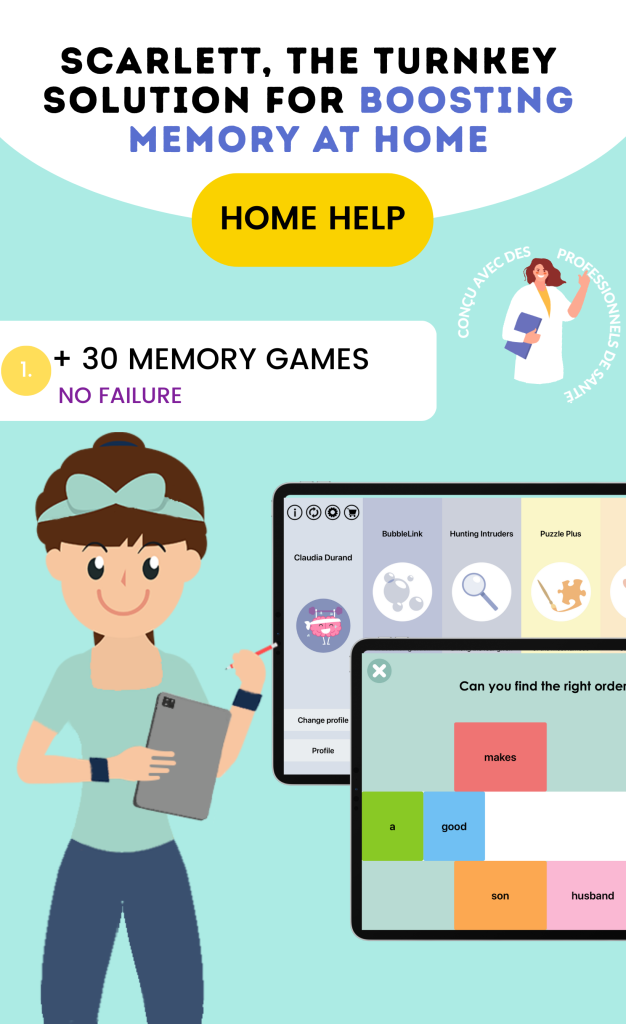Being a family caregiver means taking on a multifaceted role, a marathon of endurance where both heart and mind are constantly engaged. You juggle medical appointments, treatments, household management, and emotional support. In this daily race, it's easy to forget yourself, to set aside your own needs until alarm signals ring out. One of the most insidious aspects of this role is the mental load, that invisible weight that bears down on your shoulders and, more specifically, on your cognitive abilities. Fading memory, evaporating concentration, decision-making becoming a mountain to climb... these are not signs of weakness, but symptoms of an overloaded brain.This is where the idea of taking care of your own mind becomes not a luxury, but a necessity. Just as an athlete prepares their body for a challenge, you can train your brain to better face daily challenges. Preventing burnout is not just about resting; it's also about strengthening the tools at your disposal. This article explores how cognitive training, particularly through tools like our JOE app, your brain coach, can become a valuable ally for you caregivers, helping to preserve your most precious resource: your mental well-being.The caregiver role is often perceived through the lens of physical tasks and emotional support. Yet, much of the work occurs at an invisible level, inside your mind. This constant mental load is a major source of burnout, as it never really stops. Your brain is like a computer with dozens of tabs open simultaneously, each demanding a share of its processing power.
The Mental Load: A Permanent Conductor
As a caregiver, you are the planner, coordinator, logistician, and crisis manager. You must remember medication dosages, prescription renewal dates, appointments with the physiotherapist or specialist. You anticipate your loved one's needs, organize meals according to their diet, manage administrative tasks, and ensure everything runs smoothly. This constant orchestration relentlessly demands your executive functions, that is, your brain's ability to plan, organize, and prioritize. Over time, this demand can lead to "decision fatigue," where even the simplest decision, like choosing the evening's menu, becomes exhausting.The Emotional Impact on Cognitive Abilities
Stress, anxiety, guilt, or worry are frequent companions for caregivers. These emotions are not just abstract feelings; they have a very real physiological impact. Cortisol, the stress hormone, when secreted chronically, can affect brain areas related to memory and learning, such as the hippocampus. You may have noticed that during times of great stress, you find it harder to remember simple information or to concentrate on a task. This is not a coincidence. Your cognitive bandwidth is simply saturated by managing these intense emotions, leaving less room for everything else.The Cognitive Symptoms of Emerging Burnout
Before burnout fully sets in, your brain sends you signals. Recognizing them is the first step to taking action. Have you ever searched for words in the middle of a sentence? Forgotten why you entered a room? Had trouble following a conversation or reading more than a few pages of a book? These cognitive "bugs" are often the first indicators of overload. You may experience more fragmented attention, greater difficulty switching from one task to another, or less effective working memory, forcing you to reread the same instruction multiple times. These are the cracks appearing in the foundation before the wall collapses.Cognitive Training: A Preventive Approach to Strengthen Your Mind
In the face of this overload, the instinct is often to seek to "clear your head." But another complementary approach is to "strengthen" it. Cognitive training is an active and preventive approach aimed at enhancing your brain's capabilities so that it can better bear the load. It's a bit like doing core exercises to protect your back before lifting a heavy load. You do not eliminate the load, but you equip yourself to carry it more effectively and with less risk of injury.What is Brain Training?
Cognitive training consists of a series of targeted exercises, often presented in the form of games, designed to stimulate specific brain functions. It is not about doing crossword puzzles randomly but following a structured program that engages memory, attention, processing speed, mental flexibility, or executive functions. The principle is based on neuroplasticity, the brain's remarkable ability to reorganize itself and create new neural connections throughout life in response to stimuli. By regularly practicing these exercises, you maintain and strengthen these neural circuits.Why is it Particularly Relevant for Caregivers?
For a caregiver, sharp cognitive abilities are not just an intellectual asset; they are essential tools for daily work. A better working memory helps you remember the list of questions to ask the doctor. Sustained attention allows you to focus on a complex administrative task despite interruptions. Greater mental flexibility helps you adapt calmly when an unexpected event disrupts your meticulously planned day. By strengthening these skills, you are not just "working better"; you reduce the mental effort needed to accomplish your tasks. Each action becomes smoother, less energy-consuming, freeing up mental resources and decreasing the feeling of overload.The Brain is a Muscle That Needs Exercise
The metaphor is well-known, but it is particularly apt. If you stop all physical activity, your muscles atrophy. Similarly, if you let your brain operate on autopilot, without ever challenging it with new and stimulating tasks, its capabilities can decline, especially during periods of chronic stress. Cognitive training is your brain gym. It is a moment you give yourself to actively stimulate different areas of your brain, keep them fit, and even improve their performance.CLINT, Your Brain Coach: A Concrete and Accessible Solution

A Personalized Program That Adapts to You
From your first use, CLINT assesses your performance in different cognitive areas to establish your starting profile. From there, the app offers you a tailored daily program. The difficulty of the exercises automatically adjusts based on your results. If you succeed easily, the level increases to continue challenging you. If you struggle, the exercise adapts to avoid failure. This adaptive approach is crucial: it ensures that you are always working within your optimal "challenge zone," where the brain progresses the most, without generating frustration.Targeting Key Cognitive Skills for Caregivers
CLINT focuses on the brain functions that are most demanded and most strained by the mental load of caregiving. The program is designed to strengthen the pillars of your daily life.- Memory: Essential for remembering treatments, appointments, or medical instructions. CLINT offers exercises where you need to memorize shopping lists, sequences of shapes, or the location of objects. For example, a game might ask you to remember the medications to be given at specific times, simulating a real situation in a fun way.
- Attention: Crucial for staying focused during an important conversation with a healthcare professional or for filling out administrative documents without making mistakes. CLINT's attention games may require you to track a moving target among distractors or to spot a specific symbol in a rapidly scrolling grid.
- Executive Functions: These are the skills of the "conductor" (planning, organization, problem-solving). They are at the heart of your role. To train them, CLINT offers logical puzzles, strategy games where you need to anticipate several moves ahead, or exercises that require classifying and organizing information according to changing rules.
- Mental Flexibility: The ability to switch from one task to another and adapt to unexpected events. A caregiver must constantly demonstrate flexibility. CLINT stimulates this skill with games where the rules change during play, forcing you to abandon one strategy to quickly adopt a new one.
Integrating CLINT into a Busy Schedule
The main objection is often: "I don't have time for this." CLINT has been designed with this constraint in mind. A training session lasts only 10 to 15 minutes. It's the length of a coffee break, the waiting time in a waiting room, or the few quiet minutes in the evening once everything is calm. Consider this moment not as an additional task, but as a "mental coffee break." A short moment you reserve to invest in your own well-being, with benefits that will ripple through the rest of your day.Concrete Benefits Beyond the Screen
The goal of training with CLINT is not to become a champion of brain games, but to transfer the skills acquired into your everyday life. The benefits are measured in terms of serenity, efficiency, and resilience in the face of daily challenges.A Reduction in Stress and Mental Fatigue
By making daily cognitive tasks easier, you decrease the overall mental effort. It's a bit like oiling the gears of a machine: everything runs with less friction. Planning the week becomes less laborious, remembering an important detail becomes more natural. This newfound fluidity reduces the accumulated fatigue at the end of the day and lowers the overall stress level. You feel less "on edge" all the time.Better Decision-Making and Greater Clarity of Mind
Decision fatigue is one of the major enemies of the caregiver. When the brain is exhausted, it is difficult to weigh the pros and cons, evaluate options, and make informed decisions, whether concerning your loved one's health or your own life. A trained and more rested mind is a clearer mind. You are able to analyze situations with more perspective and confidence, which is particularly important in medical contexts where decisions can have significant consequences.A Restored Sense of Control and Autonomy
Being a caregiver can sometimes feel like being swept along by events, constantly reacting to emergencies. Engaging in an active cognitive training approach is an act of empowerment. It is deciding not to be passive in the face of mental overload. It is taking care of your main working tool. This simple act of regaining control over one aspect of your well-being can have a very positive psychological effect, reinforcing your sense of competence and self-esteem.◆ ◆ ◆










